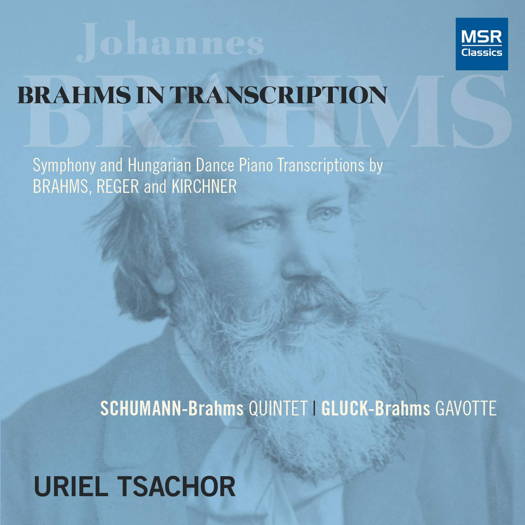- tango
- JoAnn Falletta
- Rey Andreas
- SWR Rundfunkorchester
- Beadlesound AGC
- Sir Thomas Beecham
- Bellini: La Sonnambula
- Jennifer Peedom: Mountain
 DISCUSSION: What is a work? John Dante Prevedini leads a discussion about The performing artist as co-creator, including contributions from Halida Dinova, Yekaterina Lebedeva, Béla Hartmann, David Arditti and Stephen Francis Vasta.
DISCUSSION: What is a work? John Dante Prevedini leads a discussion about The performing artist as co-creator, including contributions from Halida Dinova, Yekaterina Lebedeva, Béla Hartmann, David Arditti and Stephen Francis Vasta.
 SPONSORED: Ensemble. A Great Start - Freddie Meyers' new opera A Sketch of Slow Time impresses Alice McVeigh.
SPONSORED: Ensemble. A Great Start - Freddie Meyers' new opera A Sketch of Slow Time impresses Alice McVeigh.
All sponsored features >>

Remarkable Expressiveness
Piano transcriptions by
Kirchner, Reger and Brahms,
reviewed by GERALD FENECH
'Uriel Tsachor performs these ingenious pieces with a poetic brilliance that is consistently arresting ...'
It is pertinent for many music lovers to know that the nineteenth century was littered with many geniuses of the keyboard such as Liszt and Schumann. But apart from playing their own compositions, as was the custom, these composers also expanded a tradition that had existed for centuries, that of the piano transcription. We know of J S Bach creating transcriptions of his own works and that of others, and Beethoven also followed suit by creating significant works from his own compositions.
The expansion of this tradition was both in number and style. Composers like the ones mentioned above arranged numerous paraphrases and fantasies - mostly Liszt - based on themes from operatic and symphonic works and lieder. These works have their own form, development, harmonic language and pianistic embellishments that do not follow the original works, but instead, stand on their own as new creations.
Brahms and his musical colleagues did not form part of the nineteenth century Wagner-Liszt 'New German School', but rather remained faithful to pure, non-programmatic musical expression, continuing and building on the philosophies and technique of their predecessors. Their piano transcriptions adhered to this tradition by faithfully following as much as possible the form, mood, texture and musical layers of the original. The pieces on this recording follow this strict dictum.
The main transcribers here are Max Reger (1873-1916) and Theodor Kirchner (1820-1903). The former has five to his credit, the latter three. Reger's transcriptions include all four slow movements from Brahms' four symphonies plus the Poco Allegretto from the Third.
Listen — Brahms, transcribed by Reger: Andante sostenuto (Symphony No 1)
(track 1, 0:01-1:01) © 2019 2019 Uriel Tsachor :
Kirchner's contribution focuses on the Hungarian Dances Nos 15, 16 and 17.
Listen — Brahms, transcribed by Kirchner: Hungarian Dance No 16 in F minor
(track 6, 0:01-0:44) © 2019 2019 Uriel Tsachor :
Of course, Brahms has to feature in a programme where he is the real protagonist. So it is no surprise to find included in this project the composer's own transcriptions of his Hungarian Dances Nos 1 and 7 plus the Scherzo from Schumann's Piano Quintet, Op 44 and the Gavotte from Gluck's Iphigénie en Aulide.
Listen — Gluck, transcribed by Brahms: Gavotte (Iphigénie en Aulide)
(track 12, 2:02-3:00) © 2019 2019 Uriel Tsachor :
I must point out that the Reger and Kirchner transcriptions are world premiere recordings. Uriel Tsachor performs these ingenious pieces with a poetic brilliance that is consistently arresting, and the remarkable expressiveness of these works is brought out with great sensitivity and committed musicianship. A memorable issue, in clear sound and splendid presentation that should charm piano lovers in particular.
Copyright © 28 January 2020
Gerald Fenech,
Gzira, Malta

CD INFORMATION: BRAHMS IN TRANSCRIPTION - URIEL TSACHOR
FURTHER INFORMATION: JOHANNES BRAHMS
FURTHER INFORMATION: THEODOR KIRCHNER
FURTHER INFORMATION: MAX REGER
FURTHER INFORMATION: ROBERT SCHUMANN
FURTHER INFORMATION: CHRISTOPH WILLIBALD GLUCK
FURTHER INFORMATION: MSR CLASSICS


